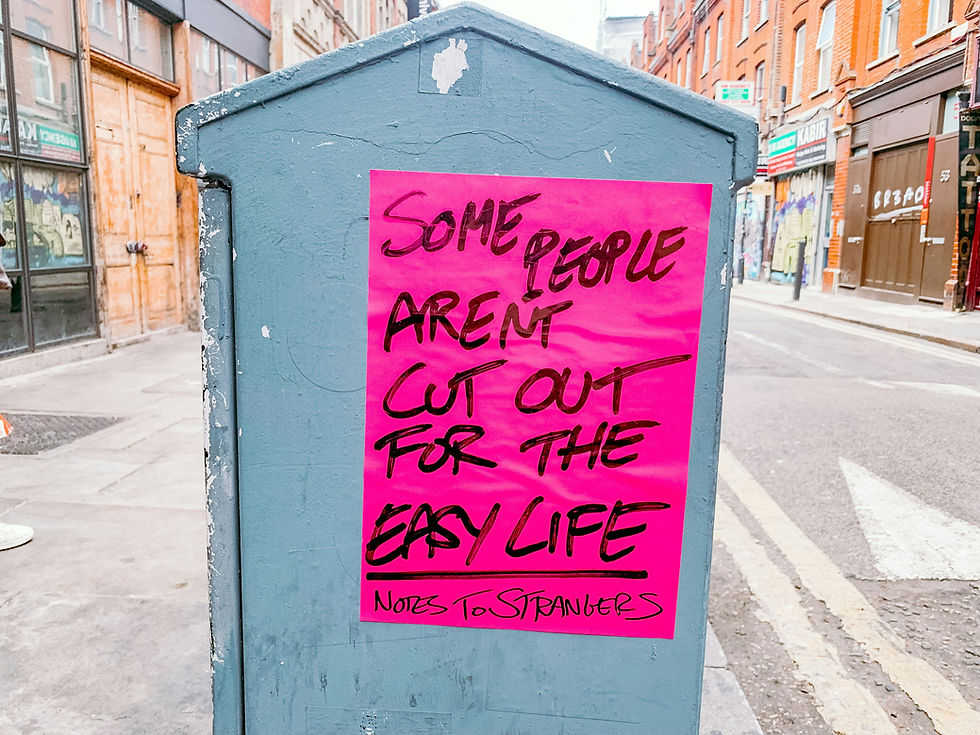I want it all and I want it now – Delayed gratification in the world of “On-Demand”
- Martyn Foster

- Oct 2, 2020
- 3 min read
Understanding our urge to give in to temptation.
Just one more episode. I’ll only have a handful. One more drink and then I’ll call it a night. Just one more game. I can pay for it later…and yes you do.
The forever conflict of satiating our impulsive desires has led us down many a dark path, in retrospect. The ability to delay gratification, that is to forgo the immediate satisfaction of something in order to achieve a more desired outcome at some future point, is usually the sign of mature psychological development. Thanks to technological advancements and the ever-present and far-reaching advertising industry, this has become an increasingly difficult thing to do.

Most people are familiar with the “marshmallow test” in psychology to illustrate the concept of delayed gratification. Basically, you can either have one marshmallow now or if you can delay your impulse for a period of time (e.g. 15 minutes), you will receive two. It is a fairly crude way to demonstrate the benefits of postponed fulfilment and examine what makes people more susceptible to temptation. The hot/cool theory of delayed gratification proposed by Janet Metcalfe and Walter Mischel some 20 years ago (see above) sought to describe two control systems underlying our behaviour; "Hot" being the emotional system designed for quick responses to stimuli and "Cool" being the rational and reflective thought system that can help us plan to achieve goals.
Modern society has become very “now”, in the sense that I want it now with minimum ease and little-to-no inconvenience…and there is always something or someone waiting to fulfil that demand. This “on-demand” culture has made it difficult to wait on our indulgences. Why watch a TV show over a series of weeks when you can binge it in a weekend? Why wait until you can afford a new lounge when you can utilise store credit and 24 months interest free?
As I mentioned earlier, technological advances are enabling and encouraging our impulsivity by providing us with endless content to stimulate us which in the end leaves us feeling rather drained. We’ve become overstimulated and thus have created a stimulus deficit, meaning we’ll need to continue with more to satisfy us – akin to addiction-like conditioning. This is why a significant number of people nowadays find it difficult to sit with stillness and slow down – and why meditation can help. There is a dangerous snowball effect with all this as making things so effortlessly and readily available actually erodes the joy that we are seeking from these things – and creates a far worse effect when it is taken away.
We must learn to sit with the discomfort and tolerate the frustration, anxiety, anger and/or disappointment that may arise for failing to quenching our instinctual pleasures in order to achieve goals and long-term happiness. Delayed gratification is a healthy and rational alternative to giving in to immediate demands. For the creative people in the audience, we know this all too well as our work rarely pays off immediately and writing a novel is not a five minute job.
Conditions which help or hinder delayed gratification include whether the focus is long-term or short-term and the level of certainty and stress. These can be at the individual or societal level. Now, COVID-19 has created a lot of uncertainty and stress and has shortened the outlook for many, so our ability to delay gratification has been hindered quite considerably (I wrote a piece earlier this year about staying motivated in uncertain times). People are more likely to delay gratification if their outlook/goals are long-term and in a predictable environment because stability breeds confidence that things will remain roughly the same and that one can plan accordingly and achieve objectives that especially take a while to complete. A high stress tolerance is desirable to overcome our temptations as we are more susceptible to impulsivity when stressed (chocolate anyone?).
The mental and physical distance we put between us and whatever is trying to grab our immediate attention is also crucial, as when a stimulus is hidden or further away it is much easier to resist. Anyone who leaves their mobile phone within arm’s reach will notice this and there have been studies which have shown that even having your phone in the same room as you detracts your attention levels away from your current task.
If you’ve made it to the end, well done, you’ve managed to forgo any immediate desires to garner some knowledge about how to overcome your immediate desires. Double win!






Comments